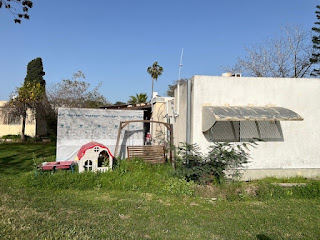In the grasslands of Kenya it’s always Mother’s day
Even on
Father’s Day.
One thing is
clear when on Safari, it’s the mothers who rule.
Father’s Day is a minor holiday in our home, and I suspect most houses, as compared to Mother’s Day.
Nothing illustrates the mother/father divide more than a recent viral video caught on a doorbell cam of a 3-year old girl walking out the front door with her dad. He is balancing his metal coffee thermos and his car keys while she is just walking along holding a doll and looking out to the front yard.
Apropos of nothing she says: “I Love you, Dad” to which he replies, “I love you too."
He locks the door behind them and then she adds: “Not as much as mommy.”
The dad looks down at the girl, then at his coffee, an expression of resignation on his face and says: "Alright, thank you for that."
Everything in the safari is mother based, except the mating.
Elephants
move across the fields, two mammoth moms surround the baby who is mostly
hidden by the tall grass. Until she is exposed, but when she is, the trunks and stumps of
legs mask the “small” creature from the dangers that
lurk day and night.
The baby giraffe hides amid the mom's legs, the baby suckling as the mother looks out for danger, a father nowhere to be found.
Even the baby Rhino, weighing in at a couple hundred pounds with a hind that can withstand a bullet doesn't leave the mother's side in the first months.
But in the Mist the baby Gorilla, who shares 98% of our DNA, breast feeds one moment and is whacked against a tree the next by a mama gorilla who needs to provide nourishment and mete out punishment. The child bounces right back.
Meanwhile the balding silver back beats his chest to show his virility to an impressed throng of women.
But then as the sun peaks through the clouds a Father's Day moment emerges.
It's mid-morning, after a full hour of munching leaves and branches the male gorilla lays on his back and lets out a fart that seems to last forever and exhaust him. Meanwhile the rest of the gorillas are busy grooming him by picking the nits from his hair and eating them.
The male gorilla just lays there, indifferent to the way his family cares for him. And I wonder if maybe even in the rainforest it was Father's Day.
For the two weeks of this trip I chose not to shave, growing a grey beard that was universally panned by the family fashion police. On this Father's Day I chose to shave it just before dinner. As I walked the dining room I rubbed my soft cheek up against my children's faces. Smiled at them. Let the fading rays of the day shine on my hairless face. But no one noticed. The new clean shave didn't elicit even a raised eyebrow."Does anyone notice anything different?" I asked as we sat down to dinner.
Three nods of no. Until one of the children asked: "Did you get a haircut?"
And they all laughed.
In the end there is no denying the place of the modern dad in the modern family.
Yes, texts in the family group chat go unnoticed, "interesting" articles and "funny" jokes go unread, but there are moments when you are reminded that you do matter and that for a moment, you are loved.
Just not as
much as mom.























